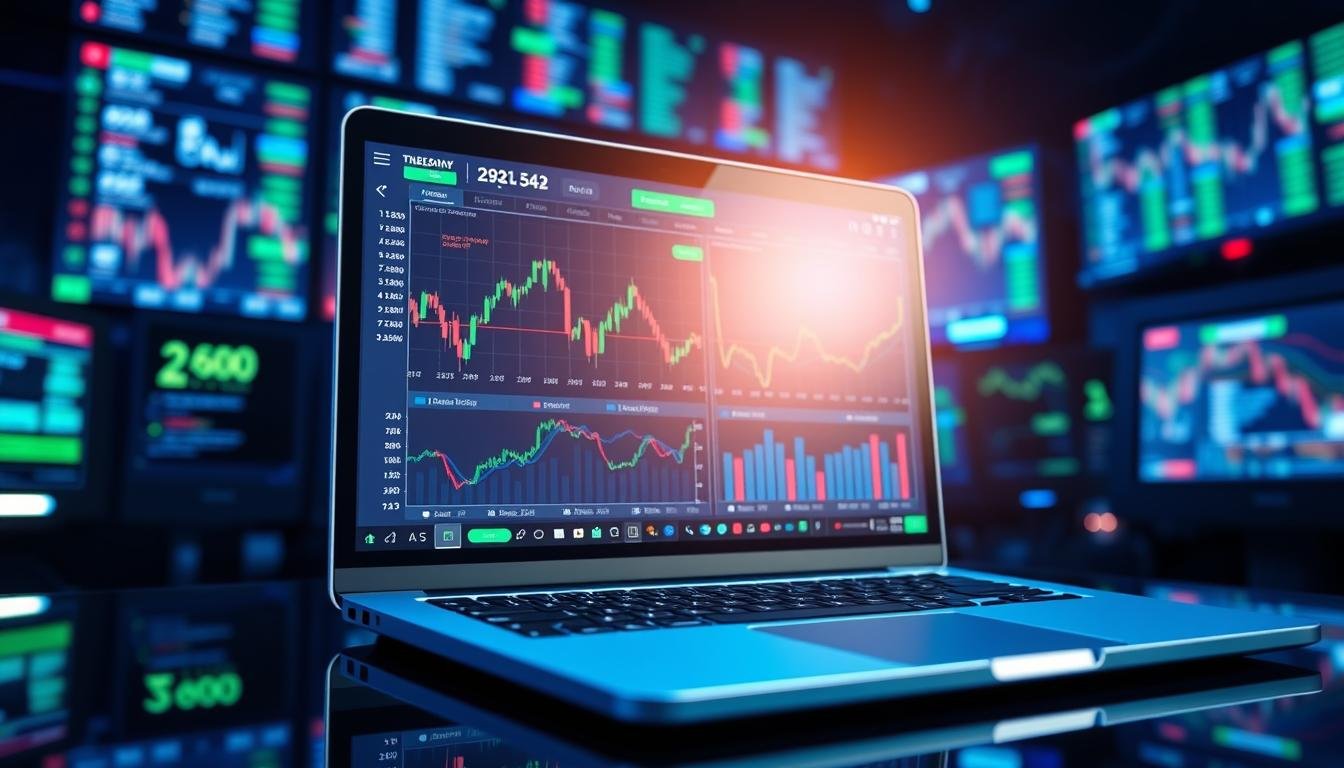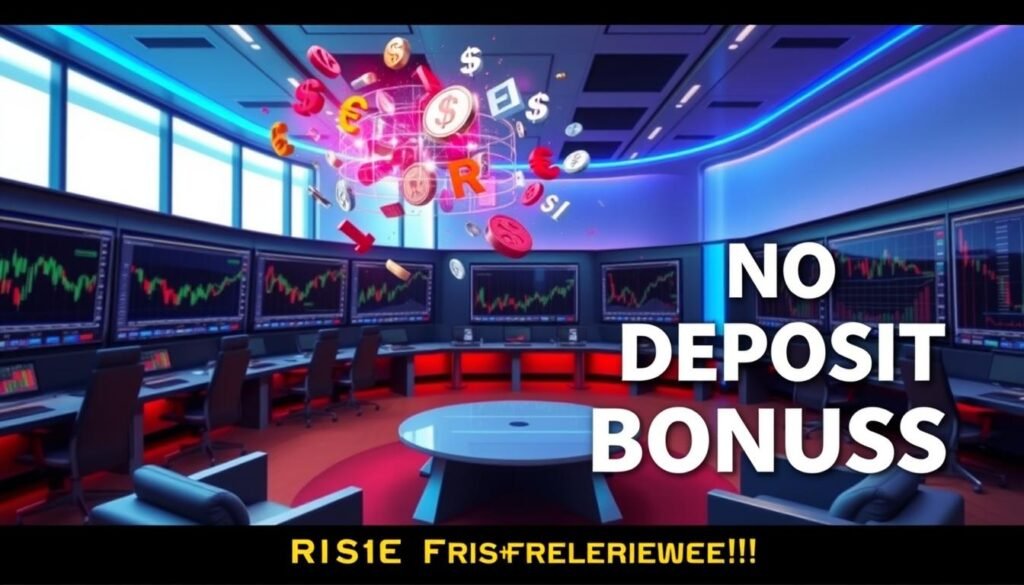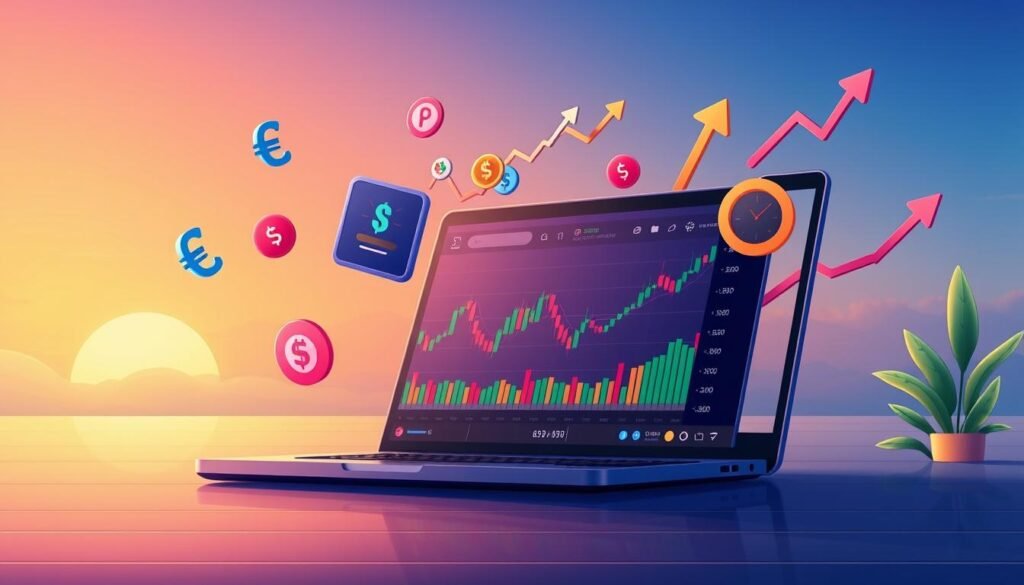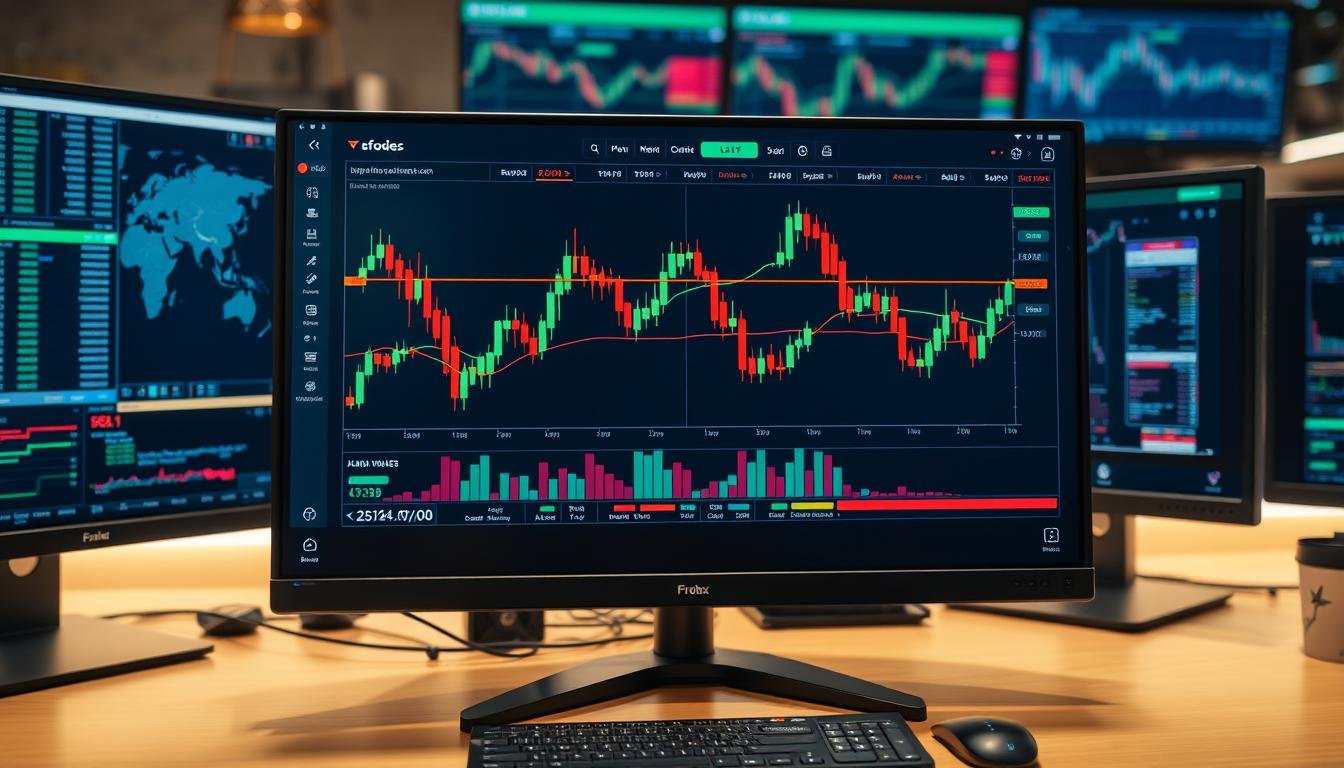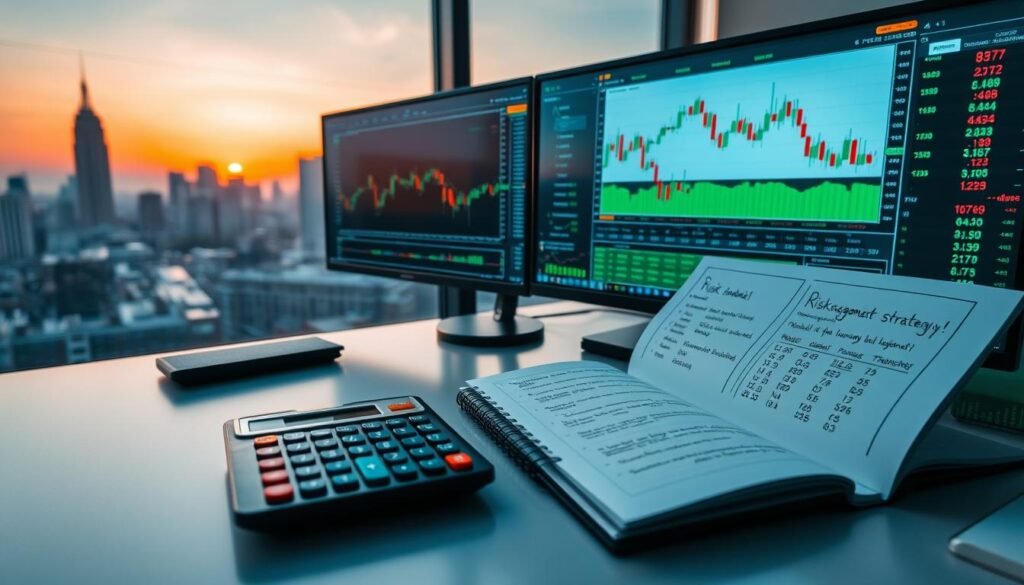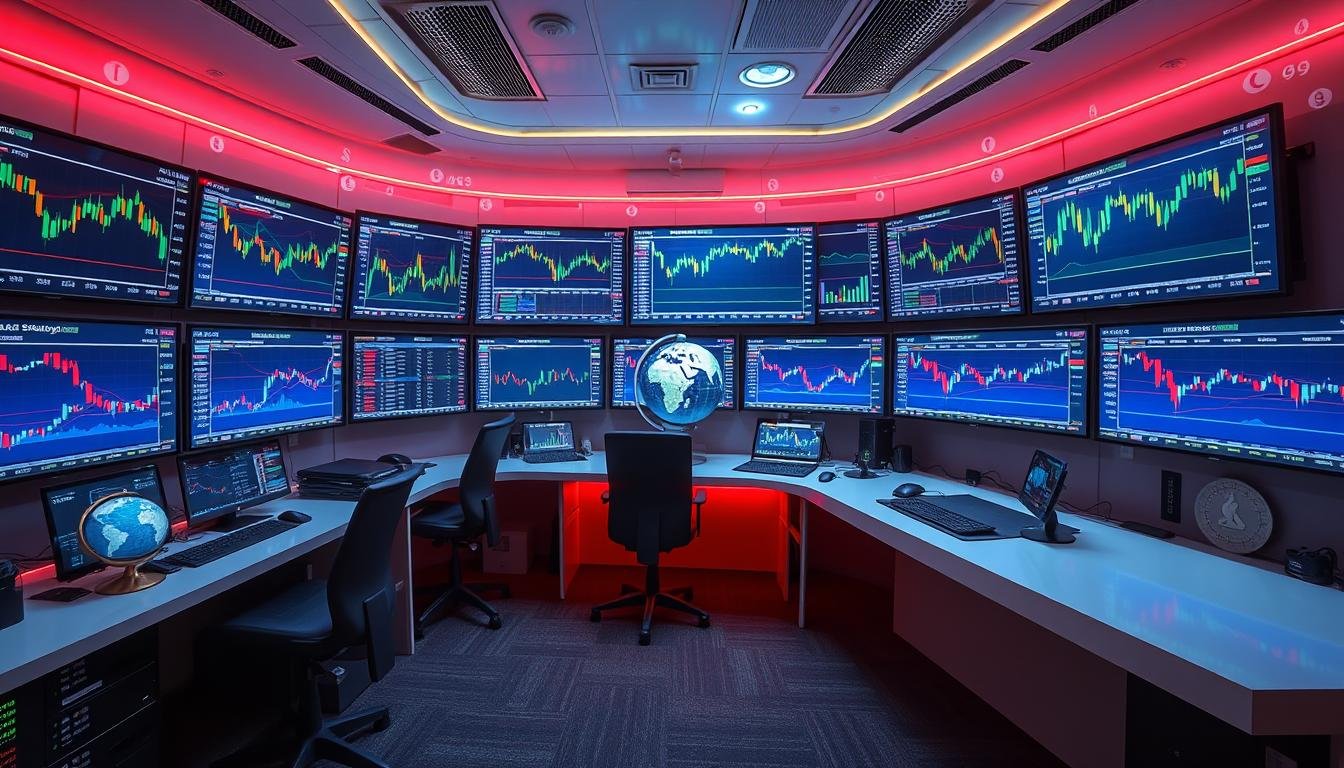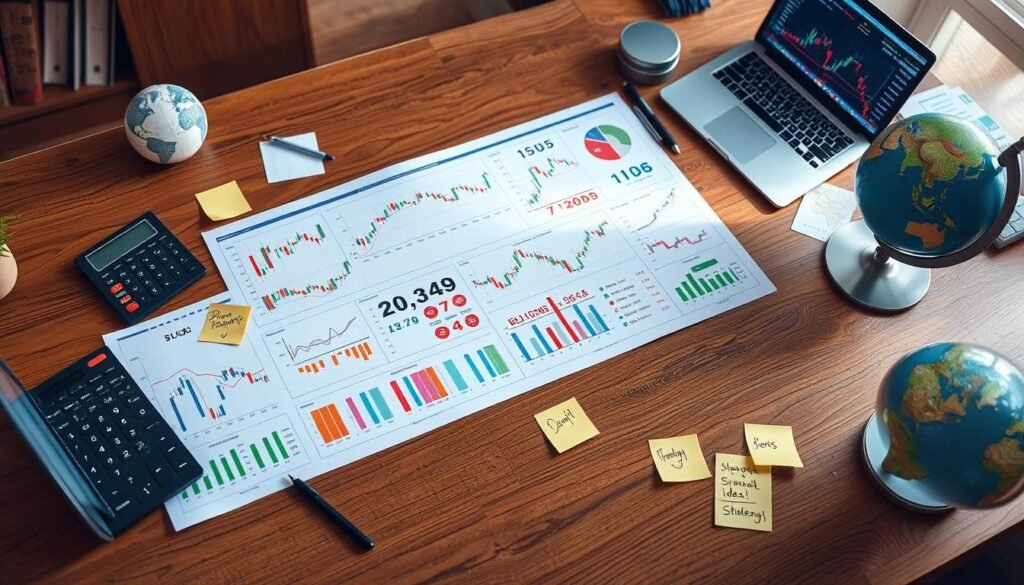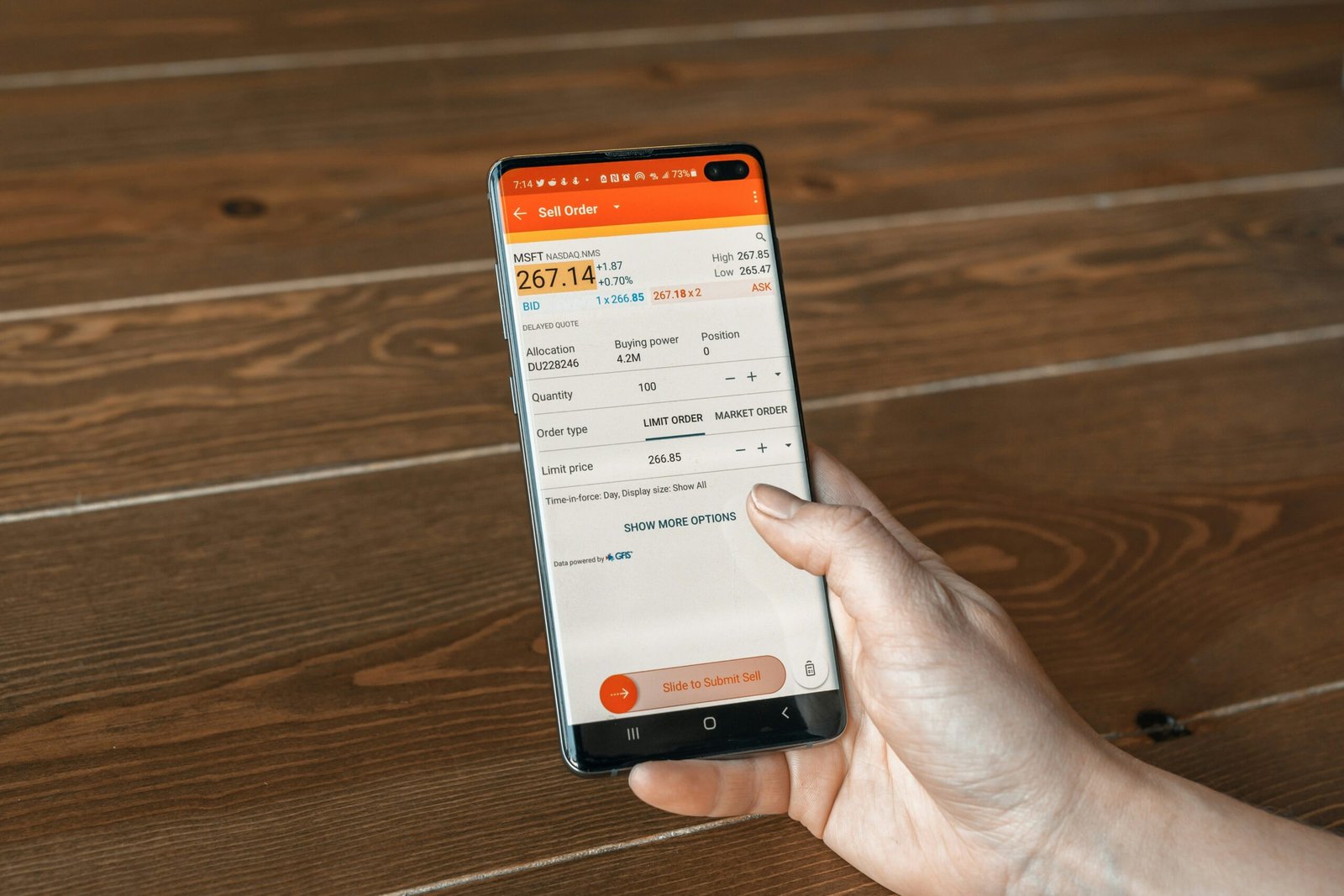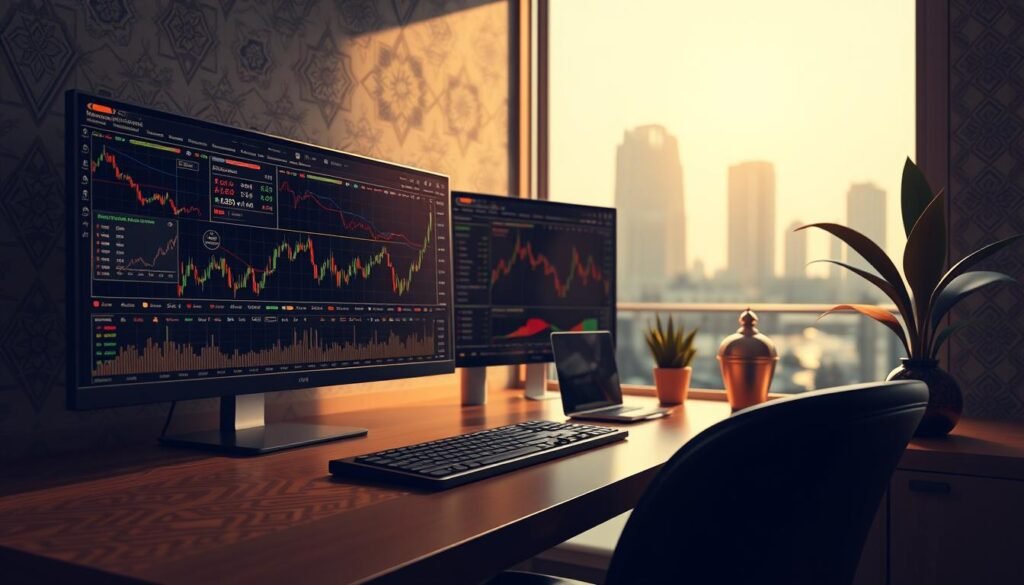Best Forex Trading Platforms: Find Your Perfect Match
Forex trading can seem overwhelming at first. But, the right platform can change everything. In this guide, we’ll look at the top forex trading platforms. We’ll cover their features, how users feel about them, and what they cost. This will help you find the best platform for your trading needs.
If you’re new to forex or have been trading for a while, this article is for you. We’ll give you the info you need to pick a platform that’s easy to use, fast, and has great tools and support. By the end, you’ll know how to choose the best platform for your success in forex trading.
Key Takeaways
- Prioritize user-friendly interfaces and intuitive navigation for a seamless trading experience.
- Look for platforms with lightning-fast execution speeds to capitalize on market opportunities.
- Consider account types and features that align with your trading style and risk tolerance.
- Ensure the platform is backed by robust regulatory compliance and security measures.
- Leverage advanced research tools and market analysis to make informed trading decisions.
Introduction to Forex Trading Platforms
The world of forex trading is vast and dynamic. Success often depends on the quality of the trading platform used. Forex trading platforms are software applications that help traders access the foreign exchange market. They provide tools and features for executing trades and managing investments.
These platforms meet the needs of traders at all levels. They are designed for both beginners and experienced traders with different goals.
One key factor is the user-friendly interface of the best forex trading platforms. A well-designed platform makes trading easier and more efficient. It allows traders to navigate the markets quickly and make informed decisions.
Features like streamlined order execution and comprehensive market analysis tools are crucial. The right platform empowers traders to maximize their potential for success.
| Feature | Importance |
|---|---|
| Intuitive Navigation | Allows traders to quickly access the information and tools they need, reducing the learning curve and improving overall productivity. |
| Customization Options | Enables traders to personalize the platform to their unique trading style and preferences, enhancing their overall experience and decision-making process. |
| Execution Speed | Ensures that trades are executed in a timely manner, minimizing the impact of market volatility and maximizing the potential for profitability. |
Exploring the vast landscape of forex trading platforms is essential. Traders need to find a platform that matches their goals, risk tolerance, and preferences. By researching and evaluating different platforms, traders can find the perfect match for their journey in forex trading.
Evaluating User-Friendly Interfaces
Choosing the right forex trading platform is key. A user-friendly interface makes trading smooth and fun. It’s all about easy navigation, customization, and quick responses.
Intuitive Navigation
A good platform should be easy to navigate. Traders need quick access to tools and data. This means clear menus and simple order placing.
Platforms that are easy to use help traders focus on their strategies. They don’t get bogged down by learning the platform.
Customization Options
The best platforms let traders customize to their liking. This includes adjusting charts and creating watchlists. It’s all about making the platform fit the trader’s style.
Customization makes trading more efficient. It helps traders work better and enjoy their time on the platform.
| Feature | Platform A | Platform B | Platform C |
|---|---|---|---|
| Intuitive Navigation | ✓ | ✓ | ✓ |
| Customization Options | ✓ | ✓ | – |
| Platform Responsiveness | ✓ | – | ✓ |
User-friendly interfaces are crucial for traders. They make trading smoother, cut down on mistakes, and boost performance.
Execution Speed: A Crucial Factor
In the fast world of forex trading, execution speed is key. Traders must ensure their orders are fast and right to grab market chances and avoid losses. Quick trade execution can turn a win into a loss.
Rapid execution speed is vital for many reasons:
- Seizing Market Opportunities: Forex markets change fast. Quick execution speed lets traders quickly enter and leave trades, catching good market moments.
- Minimizing Slippage: Slippage, the gap between expected and actual trade prices, can cause big losses. Fast execution speed cuts down slippage, keeping trade integrity.
- Reducing Risk: Slow trade execution can risk more, as prices can move against traders. Quick execution speed helps manage risks, letting traders control their positions better.
When picking the best forex trading platforms, focus on execution speed. Look for platforms that execute orders fast, within milliseconds. This ensures traders can quickly respond to market changes and grab more trading chances.
| Platform | Average Execution Speed (ms) | Order Execution Accuracy |
|---|---|---|
| Platform A | 0.12 | 99.98% |
| Platform B | 0.18 | 99.92% |
| Platform C | 0.25 | 99.85% |
The table shows execution speed‘s importance by comparing three top forex trading platforms. Platform A is the fastest and most accurate, making it a top pick for traders aiming for better trading efficiency.
Best Forex Trading Platform
Finding the “best” forex trading platform can be tricky. It depends on what each trader needs and likes. Yet, some features are key for a top platform.
Traders should look for these important things in a platform:
- Intuitive and user-friendly interface
- Reliable and lightning-fast execution speeds
- Comprehensive research and analysis tools
- Robust security measures and regulatory compliance
- Diverse account types and flexible trading options
- Responsive and knowledgeable customer support
To find the best forex trading platform, we’ve compared the top ones. We looked at their features, how well they perform, and what traders say. This helps give a full view of the best options.
| Platform | User Interface | Execution Speed | Research Tools | Regulatory Compliance | Account Types | Customer Support |
|---|---|---|---|---|---|---|
| Platform A | Highly intuitive | Instant execution | Comprehensive | Fully regulated | Standard, Professional, VIP | 24/7 responsiveness |
| Platform B | Customizable | Reliable | Robust | Regulated in multiple jurisdictions | Standard, VIP | Knowledgeable support |
| Platform C | User-friendly | Fast execution | Advanced analytics | Fully compliant | Standard, Professional | Responsive and helpful |
By looking at these points, traders can pick the best forex trading platform. It should match their trading style, risk level, and goals.
Account Types and Features
Choosing the right Forex trading platform is crucial. Brokers offer different accounts for all types of traders. Whether you’re new or experienced, there’s an account for you.
Standard Accounts
Standard accounts are the most common. They have the basic tools for Forex trading. You get competitive spreads and access to many currency pairs.
These accounts also come with a user-friendly platform. This makes starting your trading journey easier.
Professional and VIP Accounts
For a more advanced trading experience, consider professional or VIP accounts. These offer:
- Tighter spreads and better trading conditions
- More trading tools and analysis resources
- Dedicated account managers and support
- Exclusive educational materials and insights
- Priority orders and special treatment
| Feature | Standard Account | Professional/VIP Account |
|---|---|---|
| Spread | Competitive | Tighter and more competitive |
| Trading Tools | Basic | Advanced analytics and research tools |
| Support | General customer service | Dedicated account managers and priority support |
| Education | Limited resources | Exclusive educational materials and training |
Understanding the different account types helps you pick the right platform. It should match your trading goals and experience level.
Customer Support: Responsiveness Matters
Good customer support is key in forex trading. Traders need help that is quick, smart, and tailored to their needs. This support is crucial for handling the forex market’s challenges and finding success.
When choosing a forex trading platform, look for brokers that value support and responsiveness. The top platforms have experts ready to help through live chat, email, or phone. They should quickly and correctly solve your problems, helping you trade smoothly.
| Feature | Importance |
|---|---|
| 24/7 Customer Support | Ensures traders can access help whenever they need it, regardless of time zone or market conditions. |
| Multilingual Support | Caters to a diverse client base and provides assistance in the trader’s preferred language. |
| Response Time | Prompt resolution of issues and inquiries is crucial for maintaining trader confidence and satisfaction. |
| Knowledgeable Agents | Well-trained representatives who can provide in-depth, accurate guidance on trading strategies and platform features. |
By focusing on customer support and responsiveness, forex traders get the help they need. This confidence helps them make smart trading choices.

“Responsive customer support can mean the difference between a successful trading experience and a frustrating one.”
Regulatory Compliance and Security
In the fast-paced world of forex trading, keeping your money and personal info safe is key. It’s important to choose a trading platform that follows the highest standards. This helps protect your funds and keeps your personal details secure.
Trusted Regulatory Bodies
When picking a forex trading platform, look for ones backed by top financial authorities. These include:
- The Financial Conduct Authority (FCA) in the United Kingdom
- The Commodity Futures Trading Commission (CFTC) in the United States
- The Australian Securities and Investments Commission (ASIC) in Australia
- The National Futures Association (NFA) in the United States
These bodies make sure forex brokers follow strict rules. This adds an extra layer of protection for traders.
| Regulatory Body | Jurisdiction | Key Responsibilities |
|---|---|---|
| Financial Conduct Authority (FCA) | United Kingdom | Regulates financial services firms and protects consumers |
| Commodity Futures Trading Commission (CFTC) | United States | Oversees the commodity futures and options markets |
| Australian Securities and Investments Commission (ASIC) | Australia | Regulates financial services and credit, and promotes investor protection |
| National Futures Association (NFA) | United States | Self-regulatory organization for the U.S. derivatives industry |
Choosing a forex trading platform regulated by these bodies gives traders peace of mind. It shows the platform’s commitment to regulatory compliance and security. This means your money and personal data are well-protected.
Research Tools and Market Analysis
Successful forex trading needs thorough research and deep market analysis. Top forex trading platforms offer a wide range of research tools. These tools give traders valuable insights, from real-time market data to economic calendars and advanced charting options.
Analytical tools are key in the fast-paced forex market. They help traders spot trends, understand market sentiment, and watch key economic indicators. Platforms that offer easy access to these tools give traders an edge. They can quickly adjust to market changes.
| Research Tool | Key Benefits |
|---|---|
| Economic Calendar | Staying informed about upcoming economic events and their potential impact on currency pairs |
| Technical Analysis Tools | Identifying market trends, support and resistance levels, and trading opportunities |
| Fundamental Analysis Tools | Assessing the underlying economic factors that influence currency valuations |
| Market Sentiment Indicators | Gauging the overall market sentiment to anticipate potential price movements |
By using the powerful research tools and market analysis from leading forex trading platforms, traders can make better decisions. This can lead to more success in the dynamic forex market.
“Comprehensive research and market analysis are the foundations of successful forex trading. The best platforms provide traders with the tools and insights they need to make informed decisions and stay ahead of the curve.”
Mobile Trading: Flexibility on the Go
In the world of forex trading, being able to trade on the move is key. Traders with access to optimized mobile apps can watch the markets and make smart choices from anywhere. This flexibility is crucial.
Optimized Mobile Apps
Top forex trading platforms know how important mobile trading is. They offer mobile trading apps that are easy to use and full of features. Traders can get real-time updates, trade, and manage their portfolios on their phones.
The best mobile trading apps have:
- Easy-to-use interfaces
- Quick order execution and live prices
- Full charting and analysis tools
- Alerts and updates
- Secure login and two-factor authentication
These advanced mobile features let traders stay in touch with the markets. They can grab opportunities on the go, whether they’re on their way to work, traveling, or not at their desk.

The mix of mobile trading and optimized mobile apps gives traders the power to manage their forex positions better. This makes their trading experience better and can lead to more success.
Pricing Structure and Commission Fees
Choosing a forex trading platform means looking at its pricing and fees. These can affect your trading costs and profits. Knowing how pricing works helps you choose wisely and get good value.
Forex platforms charge in several ways:
- Spreads – The gap between bid and ask prices, where the platform makes money on each trade.
- Commissions – Fees for making trades, often a set amount per lot or a percentage of the trade.
- Swap Rates – Overnight fees for holding positions, showing the interest rate difference between currencies.
- Withdrawal and Deposit Fees – Costs for moving money in and out of your account.
To pick the right platform, understand its pricing structure and commission fees. Look for low spreads, small commissions, and clear pricing that fits your trading style and risk level.
| Platform | Spread (EUR/USD) | Commission (per lot) | Swap Rate (long) | Withdrawal Fee |
|---|---|---|---|---|
| Platform A | 0.2 pips | $2.00 | -0.07% | $5.00 |
| Platform B | 0.1 pips | $1.50 | -0.05% | $3.00 |
| Platform C | 0.3 pips | $2.50 | -0.10% | $10.00 |
By comparing pricing structure and commission fees across platforms, you can choose the best one for your goals and budget. This helps you succeed in the forex market.
Risk Management and Trading Tools
Effective risk management is key in the fast-paced world of forex trading. Platforms with advanced trading tools help traders manage risks and investments better. Stop-loss and take-profit orders, along with hedging and scaling options, are crucial.
Stop-Loss and Take-Profit Orders
Stop-loss orders let traders set a price at which their position closes, limiting losses. Take-profit orders help lock in gains by closing a position at a profitable level. These tools keep traders disciplined and balanced, essential for success in forex trading.
Hedging and Scaling Options
Hedging reduces risk by taking an offsetting position. Forex platforms with hedging options help traders protect their investments. Scaling options let traders adjust their position size based on market conditions, helping them navigate the volatile forex market.
Using these trading tools and risk management features, traders can stay ahead and control the market better. This increases their chances of long-term success.
Conclusion
Finding the best forex trading platform is a journey with many options. Each one promises to meet your trading needs. Look for user-friendly interfaces, fast execution, and various account types.
Good customer support, regulatory compliance, and research tools are also key. Mobile trading, clear pricing, and risk management features are important too. These factors help you choose the right platform for your trading style and goals.
Whether you’re experienced or new to forex, the right platform is crucial. It can help you reach your full potential and succeed. By focusing on what matters most to you, you’ll be ready to tackle the forex market with confidence.
The best platform fits your trading approach perfectly. It gives you the tools, support, and security to succeed in the changing forex world. Making a smart choice will help you grow your trading skills and wealth.
FAQ
What are the key features to consider when choosing a forex trading platform?
When picking a forex trading platform, look at a few key things. A user-friendly interface is important. So is how fast the platform executes trades. Also, consider the types of accounts available, customer support, and if it’s regulated.
Research tools, mobile trading, and pricing are also crucial. Don’t forget about risk management features.
How important is a user-friendly interface for a forex trading platform?
A good interface makes trading easier and more fun. It should be easy to navigate and customizable. A responsive platform helps traders make quick decisions and trade smoothly.
Why is execution speed important in forex trading?
Speed is key in forex trading. Traders need fast order execution to grab market chances and avoid losses. A platform’s speed is a big factor in choosing the right one.
What types of account options are typically offered by forex trading platforms?
Forex platforms offer various accounts. Standard accounts have basic features. Professional and VIP accounts have more tools and support.
How important is customer support for a forex trading platform?
Good customer support is vital in forex trading. Look for platforms with quick, helpful, and personalized support. They can solve any trading problems.
What regulatory and security factors should be considered when choosing a forex trading platform?
Regulation and security are key when choosing a platform. Make sure it’s regulated and follows strict security measures. This protects your money and personal info.
What kind of research tools and market analysis capabilities should a forex trading platform offer?
Good research tools and market analysis are essential. They help traders make smart decisions. Look for platforms with various tools, economic calendars, and real-time data.
How important is mobile trading functionality for a forex trading platform?
Mobile trading is crucial for traders today. A good mobile app lets traders trade anywhere, anytime. It’s important for flexibility.
What should traders consider when evaluating the pricing structure and commission fees of a forex trading platform?
When looking at pricing, understand all costs. This includes spreads, commissions, and extra fees. Knowing these helps traders choose the best value.
What risk management tools and features should a forex trading platform offer?
Risk management is vital in forex trading. Look for platforms with tools like stop-loss and take-profit orders. Also, hedging and scaling options help manage risks.
